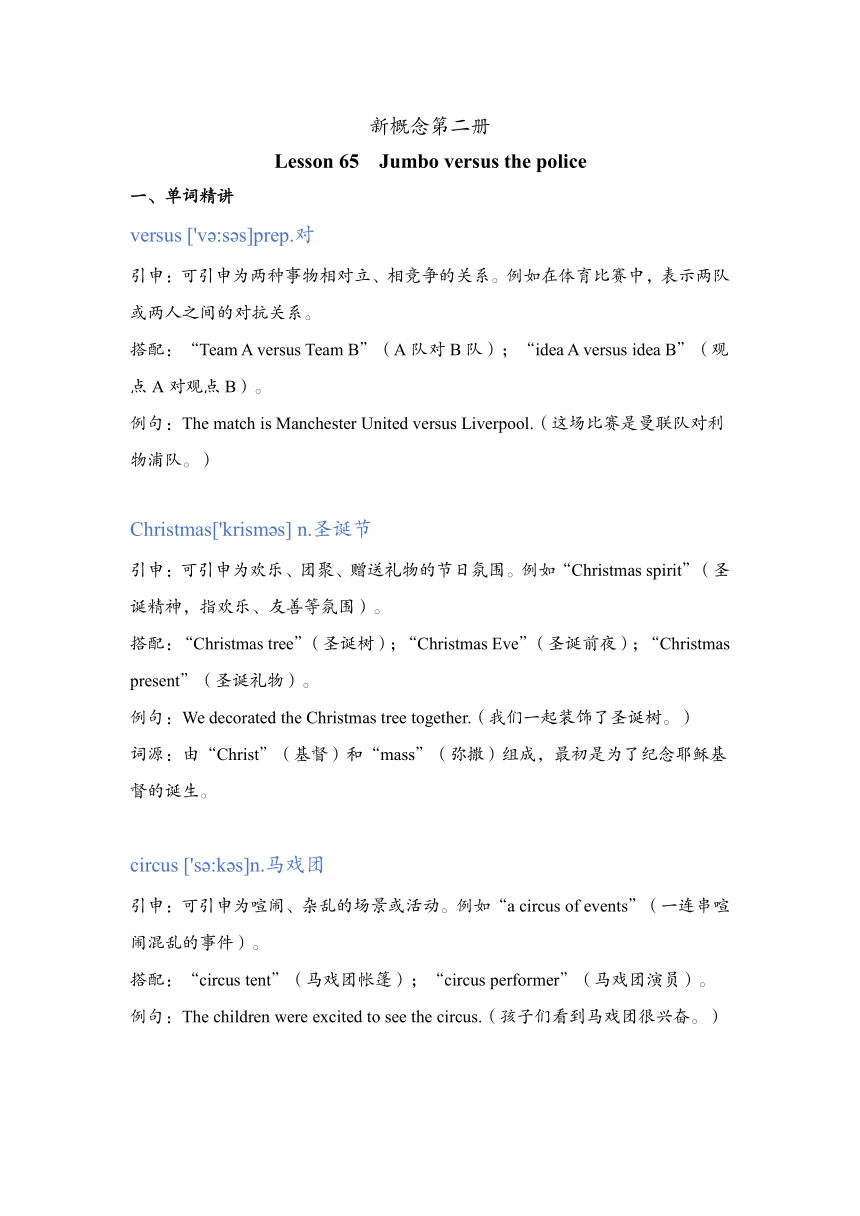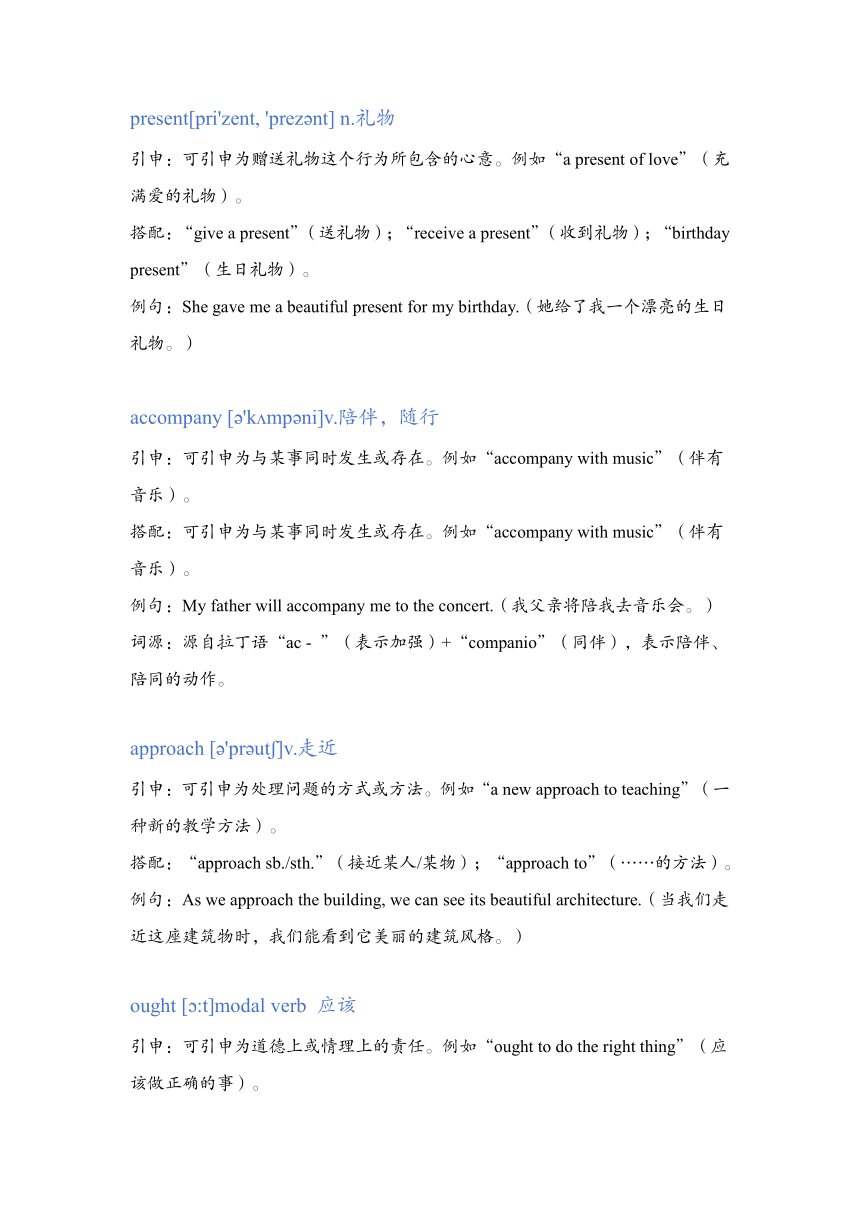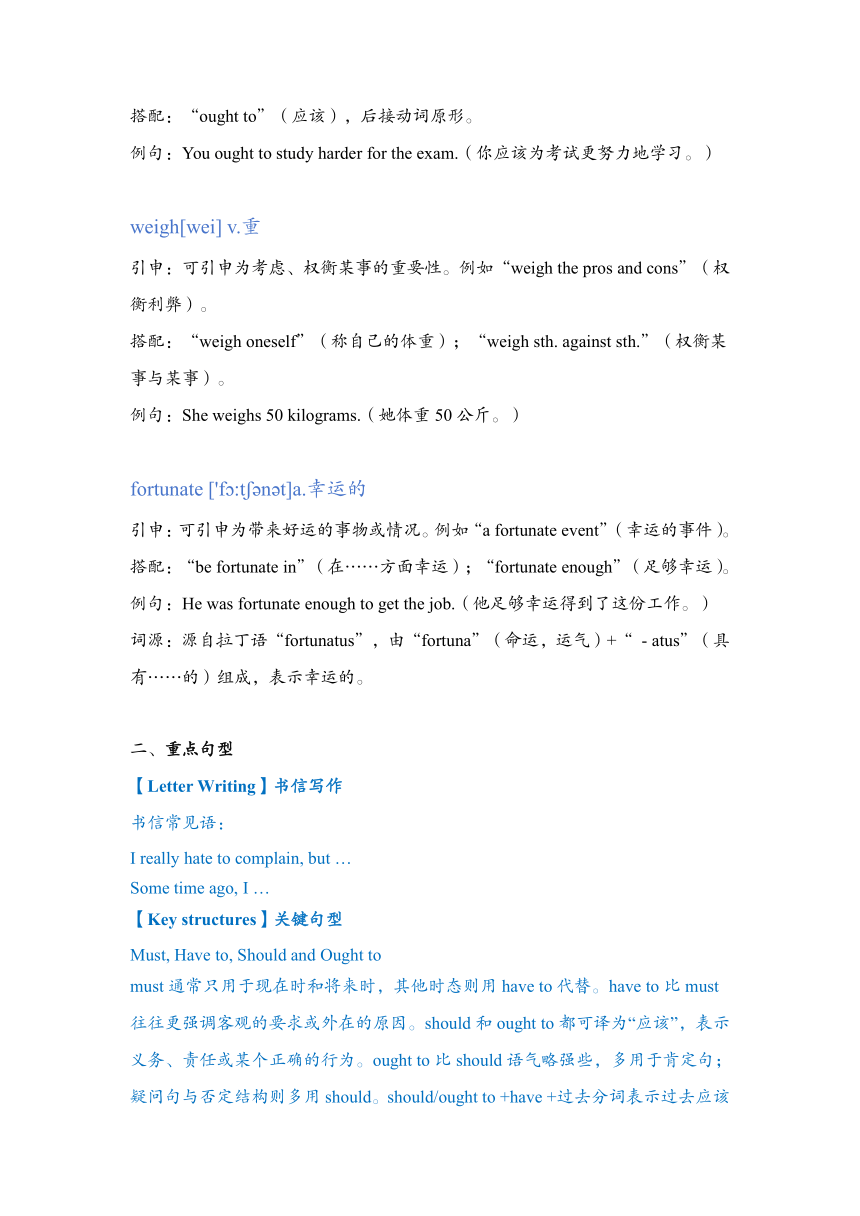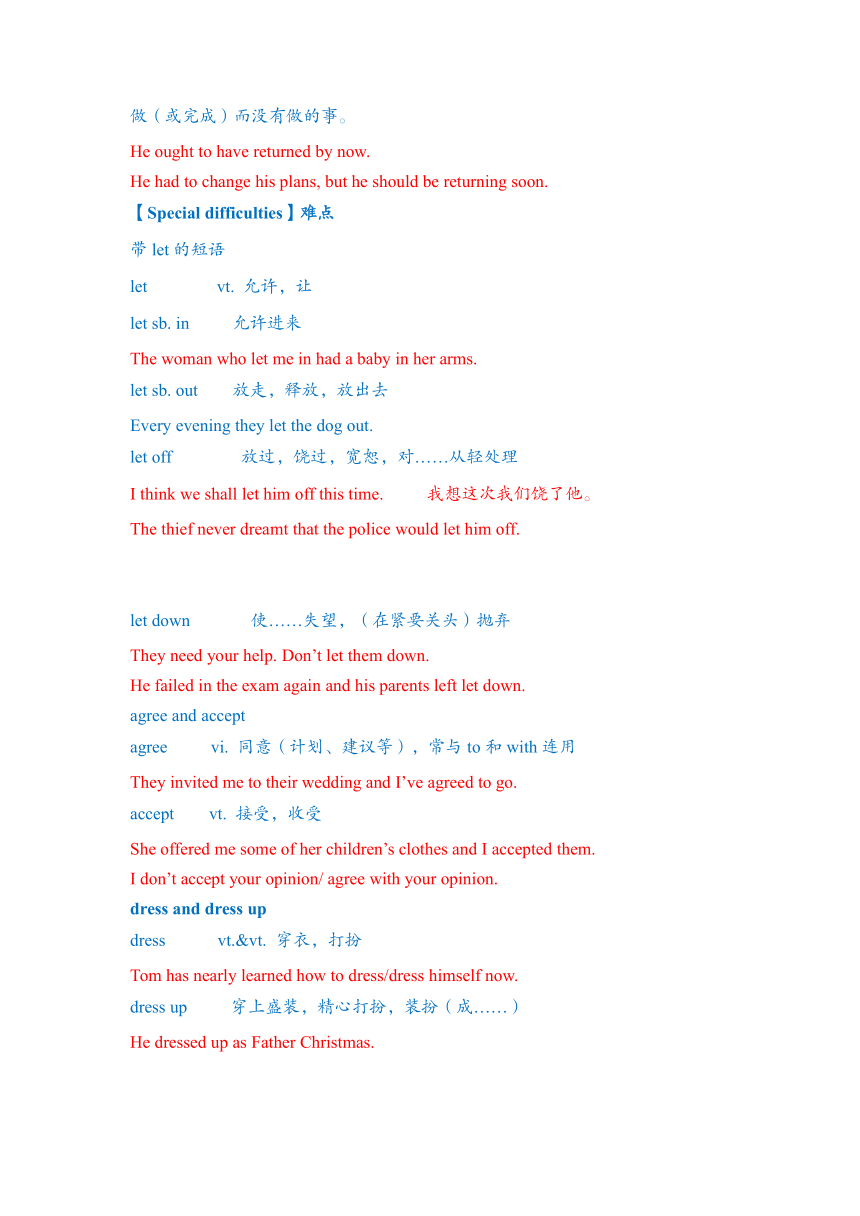新概念第二册Lesson 65 Jumbo versus the police讲义
文档属性
| 名称 | 新概念第二册Lesson 65 Jumbo versus the police讲义 |  | |
| 格式 | docx | ||
| 文件大小 | 120.0KB | ||
| 资源类型 | 教案 | ||
| 版本资源 | 新概念英语 | ||
| 科目 | 英语 | ||
| 更新时间 | 2024-11-23 21:08:28 | ||
图片预览




文档简介
新概念第二册
Lesson 65 Jumbo versus the police
单词精讲
versus ['v :s s]prep.对
引申:可引申为两种事物相对立、相竞争的关系。例如在体育比赛中,表示两队或两人之间的对抗关系。
搭配:“Team A versus Team B”(A队对B队);“idea A versus idea B”(观点A对观点B)。
例句:The match is Manchester United versus Liverpool.(这场比赛是曼联队对利物浦队。)
Christmas['krism s] n.圣诞节
引申:可引申为欢乐、团聚、赠送礼物的节日氛围。例如“Christmas spirit”(圣诞精神,指欢乐、友善等氛围)。
搭配:“Christmas tree”(圣诞树);“Christmas Eve”(圣诞前夜);“Christmas present”(圣诞礼物)。
例句:We decorated the Christmas tree together.(我们一起装饰了圣诞树。)
词源:由“Christ”(基督)和“mass”(弥撒)组成,最初是为了纪念耶稣基督的诞生。
circus ['s :k s]n.马戏团
引申:可引申为喧闹、杂乱的场景或活动。例如“a circus of events”(一连串喧闹混乱的事件)。
搭配:“circus tent”(马戏团帐篷);“circus performer”(马戏团演员)。
例句:The children were excited to see the circus.(孩子们看到马戏团很兴奋。)
present[pri'zent, 'prez nt] n.礼物
引申:可引申为赠送礼物这个行为所包含的心意。例如“a present of love”(充满爱的礼物)。
搭配:“give a present”(送礼物);“receive a present”(收到礼物);“birthday present”(生日礼物)。
例句:She gave me a beautiful present for my birthday.(她给了我一个漂亮的生日礼物。)
accompany [ 'k mp ni]v.陪伴,随行
引申:可引申为与某事同时发生或存在。例如“accompany with music”(伴有音乐)。
搭配:可引申为与某事同时发生或存在。例如“accompany with music”(伴有音乐)。
例句:My father will accompany me to the concert.(我父亲将陪我去音乐会。)
词源:源自拉丁语“ac - ”(表示加强)+“companio”(同伴),表示陪伴、陪同的动作。
approach [ 'pr ut ]v.走近
引申:可引申为处理问题的方式或方法。例如“a new approach to teaching”(一种新的教学方法)。
搭配:“approach sb./sth.”(接近某人/某物);“approach to”(……的方法)。
例句:As we approach the building, we can see its beautiful architecture.(当我们走近这座建筑物时,我们能看到它美丽的建筑风格。)
ought [ :t]modal verb 应该
引申:可引申为道德上或情理上的责任。例如“ought to do the right thing”(应该做正确的事)。
搭配:“ought to”(应该),后接动词原形。
例句:You ought to study harder for the exam.(你应该为考试更努力地学习。)
weigh[wei] v.重
引申:可引申为考虑、权衡某事的重要性。例如“weigh the pros and cons”(权衡利弊)。
搭配:“weigh oneself”(称自己的体重);“weigh sth. against sth.”(权衡某事与某事)。
例句:She weighs 50 kilograms.(她体重50公斤。)
fortunate ['f :t n t]a.幸运的
引申:可引申为带来好运的事物或情况。例如“a fortunate event”(幸运的事件)。搭配:“be fortunate in”(在……方面幸运);“fortunate enough”(足够幸运)。
例句:He was fortunate enough to get the job.(他足够幸运得到了这份工作。)
词源:源自拉丁语“fortunatus”,由“fortuna”(命运,运气)+“ - atus”(具有……的)组成,表示幸运的。
重点句型
【Letter Writing】书信写作
书信常见语:
I really hate to complain, but …
Some time ago, I …
【Key structures】关键句型
Must, Have to, Should and Ought to
must通常只用于现在时和将来时,其他时态则用have to代替。have to比must往往更强调客观的要求或外在的原因。should和ought to都可译为“应该”,表示义务、责任或某个正确的行为。ought to比should语气略强些,多用于肯定句;疑问句与否定结构则多用should。should/ought to +have +过去分词表示过去应该做(或完成)而没有做的事。
He ought to have returned by now.
He had to change his plans, but he should be returning soon.
【Special difficulties】难点
带let的短语
let vt. 允许,让
let sb. in 允许进来
The woman who let me in had a baby in her arms.
let sb. out 放走,释放,放出去
Every evening they let the dog out.
let off 放过,饶过,宽恕,对……从轻处理
I think we shall let him off this time. 我想这次我们饶了他。
The thief never dreamt that the police would let him off.
let down 使……失望,(在紧要关头)抛弃
They need your help. Don’t let them down.
He failed in the exam again and his parents left let down.
agree and accept
agree vi. 同意(计划、建议等),常与to和with连用
They invited me to their wedding and I’ve agreed to go.
accept vt. 接受,收受
She offered me some of her children’s clothes and I accepted them.
I don’t accept your opinion/ agree with your opinion.
dress and dress up
dress vt.&vt. 穿衣,打扮
Tom has nearly learned how to dress/dress himself now.
dress up 穿上盛装,精心打扮,装扮(成……)
He dressed up as Father Christmas.
课文精讲
Last Christmas, the circus owner, Jimmy Gates, decided to take some presents to a children's hospital.
去年圣诞节, 马戏团老板吉米·盖茨决定送些礼物给儿童医院。
take…to 把……送到
主要结构是“主语 + decided to do sth.”,“decide to do sth.”是固定搭配,表示“决定做某事”,在这里“decide”使用了一般过去式“decided”,“take sth. to some place”也是固定搭配,表示“把某物带到某地”,在句中表示把一些礼物带到儿童医院。
Dressed up as Father Christmas and accompanied by a 'guard of honour' of six pretty girls, he set off down the main street of the city riding a baby elephant called Jumbo.
他打扮成圣诞老人, 在由6个漂亮姑娘组成的 “仪仗队” 的陪同下, 骑上一头名叫江伯的小象, 沿着城里的主要街道出发了。
“Dressed up as...”表示“装扮成……”,“accompanied by...”表示“由……陪伴”,这两个短语描述了他出发时的状态。主句是“he set off down the main street of the city riding a baby elephant called Jumbo”,“set off”表示“出发”,“riding a baby elephant called Jumbo”是伴随状语,表示他出发时骑着一头叫Jumbo的小象。
在伴随状语中,“dress up”和“accompany”都使用了非谓语形式(过去分词形式),与主语“he”形成被动关系。“ride a baby elephant”是一个动宾结构,“called Jumbo”是后置定语,用来修饰“a baby elephant”。
dress up as… 装扮成为……(的样子)
dress up 打扮
a guard of honour 仪仗队
of six pretty girls中的of表示“由……组成的”
A group of six Chinese boys took part in the competition.
set off 出发
He should have known that the police would never allow this sort of thing.
他本该知道警察绝不会允许这类事情发生。
虚拟语气的运用
“should have known”是虚拟语气,表示“本应该知道”,暗示他实际上不知道。这是对过去情况的一种假设性的批评。
宾语从句结构
“that the police would never allow this sort of thing”是宾语从句,作“known”的宾语。在这个宾语从句中,“the police”是主语,“would never allow”是谓语,“this sort of thing”是宾语,使用了“would + 动词原形”的结构,表示过去将来时。
should have done 原本应该发生而没发生
You should have come earlier.
needn't have done 过去不必做但是做了
ought to have done 也表示原本应该做而没做
所有的情态动词+have done都跟过去有关
A policeman approached Jimmy and told him he ought to have gone along a side street as Jumbo was holding up the traffic.
一个警察走过来告诉吉米, 他应该走一条小路, 因为江伯阻碍了交通。
在宾语从句中,“ought to have gone”是虚拟语气,表示“本应该走”。“as Jumbo was holding up the traffic”是原因状语从句,“hold up”表示“阻碍”,这里使用了过去进行时,表示当时Jumbo正在阻碍交通。
as=because
hold up the traffic 阻碍交通
If you park the car in the street, it’ll hold up the traffic.
Though Jimmy agreed to go at once, Jumbo refused to move.
虽然吉米同意马上就走, 但江伯却拒绝移动。
“Though Jimmy agreed to go at once”是让步状语从句,“though”引导让步状语从句,表示“虽然,尽管”,在这个从句中“agreed to do sth.”表示“同意做某事”。主句是“Jumbo refused to move”,“refuse to do sth.”表示“拒绝做某事”,描述了尽管Jimmy同意马上走,但是Jumbo拒绝移动的情况。
agree to do sth. 同意做某事(to 为不定式 )
agree with sb. 同意某人(的建议等)
I agree with you.
agree to sth.
I agree to your advice.
I agree to go with you.
Fifteen policemen had to push very hard to get him off the main street.
15个警察不得不用很大的力气把它推离主要街道。
“had to”表示“不得不”,强调客观上的必要性。“to get him off the main street”是目的状语,表示用力推的目的是把Jumbo从主街上弄走。
“get...off...”是固定短语,表示“使……离开……”,在句中表示使Jumbo离开主街。
get off 从……移去/除去 (off=away from 离开什么地方)
Please get the box off the boat.
“The police had a difficult time, but they were most amused. '
警察虽然吃了苦头, 但他们还是感到很有趣。
“The police had a difficult time, but they were most amused.”是一个由“but”连接的并列句。前半句描述警察经历了一段困难的时间,后半句描述他们却觉得很有趣
'Jumbo must weigh a few tons,' said a policeman afterwards, 'so it was fortunate that we didn't have to carry him. Of course, we should arrest him, but as he has a good record, we shall let him off this time.'
“江伯一定有好几吨重, “一个警察事后这样说, “值得庆幸的是它没让我们抬它走。当然, 我们应该逮捕它, 但由于它一贯表现很好, 这次我们饶了它。“
'Jumbo must weigh a few tons,' said a policeman afterwards”是直接引语,引用了一个警察后来所说的话,“must”在这里表示推测,“weigh”是动词原形,表示“重”。“so it was fortunate that we didn't have to carry him”是一个结果状语从句,“it was fortunate that...”是一个常用结构,表示“……是幸运的”,“didn't have to”表示“不必”。
afterwards =later后来
It was fortunate that… 幸运的是……
let sb. off 饶恕某人,放过……,对……从轻处理
record n. 纪录;(警察局的)记录,历史,成绩
set up a new world record
sb. have a good record 表现一贯很好
Her record as a secretary in the firm isn’t very good.
resume n. 摘要, 概略, <美> 履历
vt. 再继续, 重新开始, 重新占用, 再用, 恢复
Lesson 65 Jumbo versus the police
单词精讲
versus ['v :s s]prep.对
引申:可引申为两种事物相对立、相竞争的关系。例如在体育比赛中,表示两队或两人之间的对抗关系。
搭配:“Team A versus Team B”(A队对B队);“idea A versus idea B”(观点A对观点B)。
例句:The match is Manchester United versus Liverpool.(这场比赛是曼联队对利物浦队。)
Christmas['krism s] n.圣诞节
引申:可引申为欢乐、团聚、赠送礼物的节日氛围。例如“Christmas spirit”(圣诞精神,指欢乐、友善等氛围)。
搭配:“Christmas tree”(圣诞树);“Christmas Eve”(圣诞前夜);“Christmas present”(圣诞礼物)。
例句:We decorated the Christmas tree together.(我们一起装饰了圣诞树。)
词源:由“Christ”(基督)和“mass”(弥撒)组成,最初是为了纪念耶稣基督的诞生。
circus ['s :k s]n.马戏团
引申:可引申为喧闹、杂乱的场景或活动。例如“a circus of events”(一连串喧闹混乱的事件)。
搭配:“circus tent”(马戏团帐篷);“circus performer”(马戏团演员)。
例句:The children were excited to see the circus.(孩子们看到马戏团很兴奋。)
present[pri'zent, 'prez nt] n.礼物
引申:可引申为赠送礼物这个行为所包含的心意。例如“a present of love”(充满爱的礼物)。
搭配:“give a present”(送礼物);“receive a present”(收到礼物);“birthday present”(生日礼物)。
例句:She gave me a beautiful present for my birthday.(她给了我一个漂亮的生日礼物。)
accompany [ 'k mp ni]v.陪伴,随行
引申:可引申为与某事同时发生或存在。例如“accompany with music”(伴有音乐)。
搭配:可引申为与某事同时发生或存在。例如“accompany with music”(伴有音乐)。
例句:My father will accompany me to the concert.(我父亲将陪我去音乐会。)
词源:源自拉丁语“ac - ”(表示加强)+“companio”(同伴),表示陪伴、陪同的动作。
approach [ 'pr ut ]v.走近
引申:可引申为处理问题的方式或方法。例如“a new approach to teaching”(一种新的教学方法)。
搭配:“approach sb./sth.”(接近某人/某物);“approach to”(……的方法)。
例句:As we approach the building, we can see its beautiful architecture.(当我们走近这座建筑物时,我们能看到它美丽的建筑风格。)
ought [ :t]modal verb 应该
引申:可引申为道德上或情理上的责任。例如“ought to do the right thing”(应该做正确的事)。
搭配:“ought to”(应该),后接动词原形。
例句:You ought to study harder for the exam.(你应该为考试更努力地学习。)
weigh[wei] v.重
引申:可引申为考虑、权衡某事的重要性。例如“weigh the pros and cons”(权衡利弊)。
搭配:“weigh oneself”(称自己的体重);“weigh sth. against sth.”(权衡某事与某事)。
例句:She weighs 50 kilograms.(她体重50公斤。)
fortunate ['f :t n t]a.幸运的
引申:可引申为带来好运的事物或情况。例如“a fortunate event”(幸运的事件)。搭配:“be fortunate in”(在……方面幸运);“fortunate enough”(足够幸运)。
例句:He was fortunate enough to get the job.(他足够幸运得到了这份工作。)
词源:源自拉丁语“fortunatus”,由“fortuna”(命运,运气)+“ - atus”(具有……的)组成,表示幸运的。
重点句型
【Letter Writing】书信写作
书信常见语:
I really hate to complain, but …
Some time ago, I …
【Key structures】关键句型
Must, Have to, Should and Ought to
must通常只用于现在时和将来时,其他时态则用have to代替。have to比must往往更强调客观的要求或外在的原因。should和ought to都可译为“应该”,表示义务、责任或某个正确的行为。ought to比should语气略强些,多用于肯定句;疑问句与否定结构则多用should。should/ought to +have +过去分词表示过去应该做(或完成)而没有做的事。
He ought to have returned by now.
He had to change his plans, but he should be returning soon.
【Special difficulties】难点
带let的短语
let vt. 允许,让
let sb. in 允许进来
The woman who let me in had a baby in her arms.
let sb. out 放走,释放,放出去
Every evening they let the dog out.
let off 放过,饶过,宽恕,对……从轻处理
I think we shall let him off this time. 我想这次我们饶了他。
The thief never dreamt that the police would let him off.
let down 使……失望,(在紧要关头)抛弃
They need your help. Don’t let them down.
He failed in the exam again and his parents left let down.
agree and accept
agree vi. 同意(计划、建议等),常与to和with连用
They invited me to their wedding and I’ve agreed to go.
accept vt. 接受,收受
She offered me some of her children’s clothes and I accepted them.
I don’t accept your opinion/ agree with your opinion.
dress and dress up
dress vt.&vt. 穿衣,打扮
Tom has nearly learned how to dress/dress himself now.
dress up 穿上盛装,精心打扮,装扮(成……)
He dressed up as Father Christmas.
课文精讲
Last Christmas, the circus owner, Jimmy Gates, decided to take some presents to a children's hospital.
去年圣诞节, 马戏团老板吉米·盖茨决定送些礼物给儿童医院。
take…to 把……送到
主要结构是“主语 + decided to do sth.”,“decide to do sth.”是固定搭配,表示“决定做某事”,在这里“decide”使用了一般过去式“decided”,“take sth. to some place”也是固定搭配,表示“把某物带到某地”,在句中表示把一些礼物带到儿童医院。
Dressed up as Father Christmas and accompanied by a 'guard of honour' of six pretty girls, he set off down the main street of the city riding a baby elephant called Jumbo.
他打扮成圣诞老人, 在由6个漂亮姑娘组成的 “仪仗队” 的陪同下, 骑上一头名叫江伯的小象, 沿着城里的主要街道出发了。
“Dressed up as...”表示“装扮成……”,“accompanied by...”表示“由……陪伴”,这两个短语描述了他出发时的状态。主句是“he set off down the main street of the city riding a baby elephant called Jumbo”,“set off”表示“出发”,“riding a baby elephant called Jumbo”是伴随状语,表示他出发时骑着一头叫Jumbo的小象。
在伴随状语中,“dress up”和“accompany”都使用了非谓语形式(过去分词形式),与主语“he”形成被动关系。“ride a baby elephant”是一个动宾结构,“called Jumbo”是后置定语,用来修饰“a baby elephant”。
dress up as… 装扮成为……(的样子)
dress up 打扮
a guard of honour 仪仗队
of six pretty girls中的of表示“由……组成的”
A group of six Chinese boys took part in the competition.
set off 出发
He should have known that the police would never allow this sort of thing.
他本该知道警察绝不会允许这类事情发生。
虚拟语气的运用
“should have known”是虚拟语气,表示“本应该知道”,暗示他实际上不知道。这是对过去情况的一种假设性的批评。
宾语从句结构
“that the police would never allow this sort of thing”是宾语从句,作“known”的宾语。在这个宾语从句中,“the police”是主语,“would never allow”是谓语,“this sort of thing”是宾语,使用了“would + 动词原形”的结构,表示过去将来时。
should have done 原本应该发生而没发生
You should have come earlier.
needn't have done 过去不必做但是做了
ought to have done 也表示原本应该做而没做
所有的情态动词+have done都跟过去有关
A policeman approached Jimmy and told him he ought to have gone along a side street as Jumbo was holding up the traffic.
一个警察走过来告诉吉米, 他应该走一条小路, 因为江伯阻碍了交通。
在宾语从句中,“ought to have gone”是虚拟语气,表示“本应该走”。“as Jumbo was holding up the traffic”是原因状语从句,“hold up”表示“阻碍”,这里使用了过去进行时,表示当时Jumbo正在阻碍交通。
as=because
hold up the traffic 阻碍交通
If you park the car in the street, it’ll hold up the traffic.
Though Jimmy agreed to go at once, Jumbo refused to move.
虽然吉米同意马上就走, 但江伯却拒绝移动。
“Though Jimmy agreed to go at once”是让步状语从句,“though”引导让步状语从句,表示“虽然,尽管”,在这个从句中“agreed to do sth.”表示“同意做某事”。主句是“Jumbo refused to move”,“refuse to do sth.”表示“拒绝做某事”,描述了尽管Jimmy同意马上走,但是Jumbo拒绝移动的情况。
agree to do sth. 同意做某事(to 为不定式 )
agree with sb. 同意某人(的建议等)
I agree with you.
agree to sth.
I agree to your advice.
I agree to go with you.
Fifteen policemen had to push very hard to get him off the main street.
15个警察不得不用很大的力气把它推离主要街道。
“had to”表示“不得不”,强调客观上的必要性。“to get him off the main street”是目的状语,表示用力推的目的是把Jumbo从主街上弄走。
“get...off...”是固定短语,表示“使……离开……”,在句中表示使Jumbo离开主街。
get off 从……移去/除去 (off=away from 离开什么地方)
Please get the box off the boat.
“The police had a difficult time, but they were most amused. '
警察虽然吃了苦头, 但他们还是感到很有趣。
“The police had a difficult time, but they were most amused.”是一个由“but”连接的并列句。前半句描述警察经历了一段困难的时间,后半句描述他们却觉得很有趣
'Jumbo must weigh a few tons,' said a policeman afterwards, 'so it was fortunate that we didn't have to carry him. Of course, we should arrest him, but as he has a good record, we shall let him off this time.'
“江伯一定有好几吨重, “一个警察事后这样说, “值得庆幸的是它没让我们抬它走。当然, 我们应该逮捕它, 但由于它一贯表现很好, 这次我们饶了它。“
'Jumbo must weigh a few tons,' said a policeman afterwards”是直接引语,引用了一个警察后来所说的话,“must”在这里表示推测,“weigh”是动词原形,表示“重”。“so it was fortunate that we didn't have to carry him”是一个结果状语从句,“it was fortunate that...”是一个常用结构,表示“……是幸运的”,“didn't have to”表示“不必”。
afterwards =later后来
It was fortunate that… 幸运的是……
let sb. off 饶恕某人,放过……,对……从轻处理
record n. 纪录;(警察局的)记录,历史,成绩
set up a new world record
sb. have a good record 表现一贯很好
Her record as a secretary in the firm isn’t very good.
resume n. 摘要, 概略, <美> 履历
vt. 再继续, 重新开始, 重新占用, 再用, 恢复
同课章节目录
